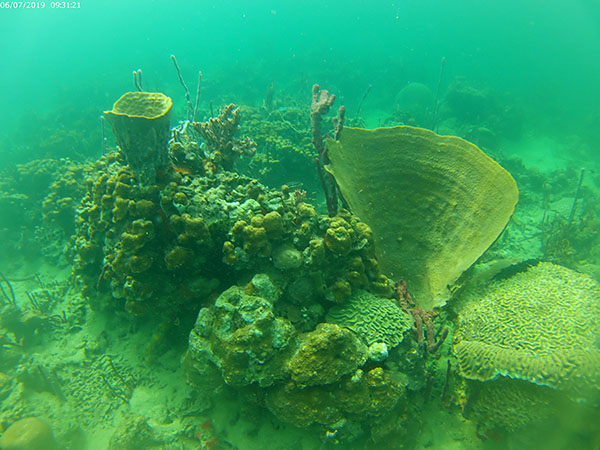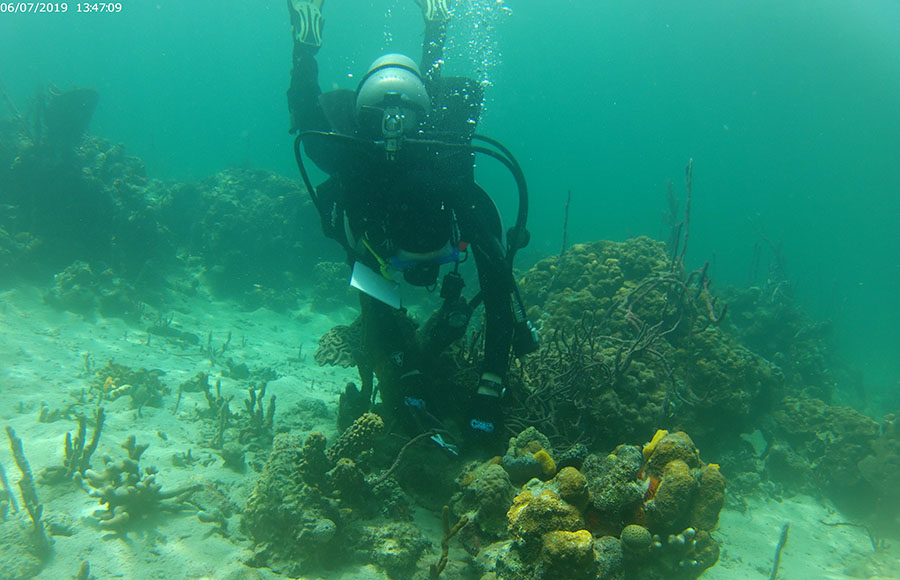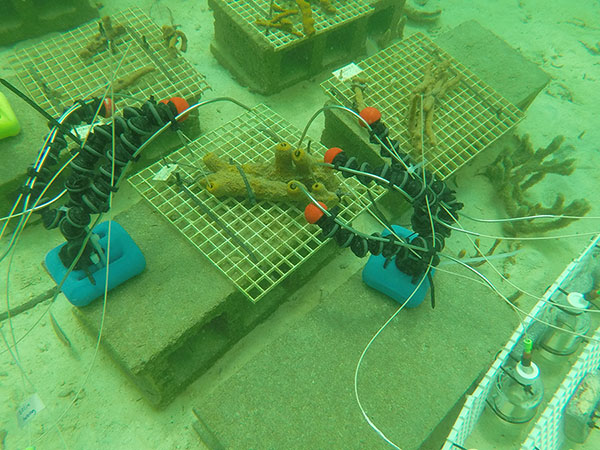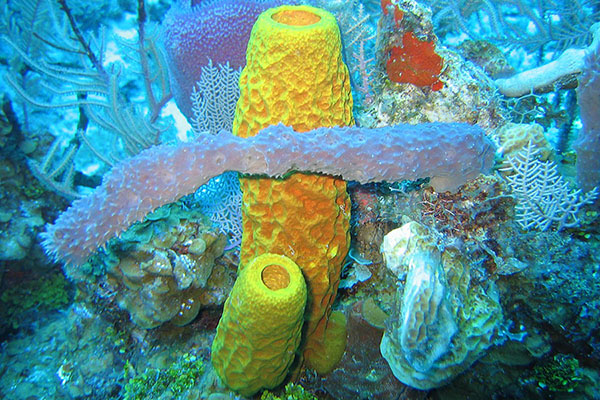BOONE, N.C. — The National Science Foundation (NSF) has awarded Dr. Cara Fiore, visiting assistant professor in Appalachian State University’s Department of Biology, more than half a million dollars in support of her continued research of sea sponges in the Caribbean.
Fiore said the primary goal of the project is to advance scientists, reef managers and policy decision-makers’ understanding of how sponges — “keystone benthic members of the reef ecosystem” — contribute to the base of the coral reef food web.
Additionally, through the development of sponge-based lessons that focus on local aquatic environments as well as coral reef ecosystems, the project will train student researchers at Appalachian and contribute to undergraduate and K–12 education.
This video, shot in summer 2019 off the coast of Bocas del Toro, Panama, shows sponge pumping activity with a nontoxic fluorescent dye. The same pumping activity will be studied by Fiore during her upcoming grant project in Curaçao, to begin summer 2020. Video courtesy of Dr. Cara Fiore
Fiore will work with Dr. Jennifer Geib, associate professor in Appalachian’s Department of Biology, and Marta Toran, outreach coordinator for the university’s Department of Geological and Environmental Sciences, to develop outreach activities for regional K-12 students that involve themes of the project.
“Sponges filter water to obtain bacteria, bits of organic matter and dissolved nutrients in the water for food, and it is because of this filtration activity that sponges can have a significant impact on the chemistry and nutrient availability in the surrounding seawater,” Fiore explained.
“An important factor in the health of coral reefs is the concentration and type of dissolved organic matter (DOM) — a complex pool of organic nutrients (e.g., vitamins),” Fiore said. “The composition of DOM on coral reefs is linked to the composition of free-living microbes in the seawater and to the nutrition of filter-feeding organisms, such as corals and sponges.”

A group of sea sponges located off the coast of Bocas del Toro, Panama, where Dr. Cara Fiore, visiting assistant professor in Appalachian’s Department of Biology, performed research of sea sponge filtration in summer 2019. Her previous research is similar to that she will perform during her upcoming grant project. Photo courtesy of Dr. Cara Fiore
However, factors that influence the composition of DOM on coral reefs and the consequences of changes in the DOM profile are not well understood, Fiore continued.
“Sponges, which are sessile filter-feeders, have high potential to influence the composition of DOM. Thus, this project will use cutting-edge analytical techniques to characterize how diverse sponge species process DOM on coral reefs and elucidate impacts of this processing on the free-living microbial community,” she said.
The seawater around coral reefs is typically low in nutrients, according to Fiore, yet coral reefs are teeming with life and often compared to oases in a desert. “Life exists in these ‘marine deserts,’ in large part, due to symbiotic associations between single-celled microbes and invertebrates such as corals and sponges,” she said.
Fieldwork for the project will take place off the coast of the Caribbean island of Curaçao in summer 2020.
What do you think?
Share your feedback on this story.
About the Department of Biology
The Department of Biology is a community of teacher-scholars, with faculty representing the full breadth of biological specializations — from molecular genetics to landscape/ecosystem ecology. The department seeks to produce graduates with sound scientific knowledge, the skills to create new knowledge, and the excitement and appreciation of scientific discovery. Learn more at https://biology.appstate.edu.
About the College of Arts and Sciences
The College of Arts and Sciences (CAS) at Appalachian State University is home to 17 academic departments, two centers and one residential college. These units span the humanities and the social, mathematical and natural sciences. CAS aims to develop a distinctive identity built upon our university's strengths, traditions and locations. The college’s values lie not only in service to the university and local community, but through inspiring, training, educating and sustaining the development of its students as global citizens. More than 6,800 student majors are enrolled in the college. As the college is also largely responsible for implementing App State’s general education curriculum, it is heavily involved in the education of all students at the university, including those pursuing majors in other colleges. Learn more at https://cas.appstate.edu.
About Appalachian State University
As a premier public institution, Appalachian State University prepares students to lead purposeful lives. App State is one of 17 campuses in the University of North Carolina System, with a national reputation for innovative teaching and opening access to a high-quality, cost-effective education. The university enrolls more than 21,000 students, has a low student-to-faculty ratio and offers more than 150 undergraduate and 80 graduate majors at its Boone and Hickory campuses and through App State Online. Learn more at https://www.appstate.edu.






![How NCInnovation Is Rethinking Economic Development in North Carolina [faculty featured]](/_images/_posts/2026/02/rethinking-economic-development-600x400.jpg)







